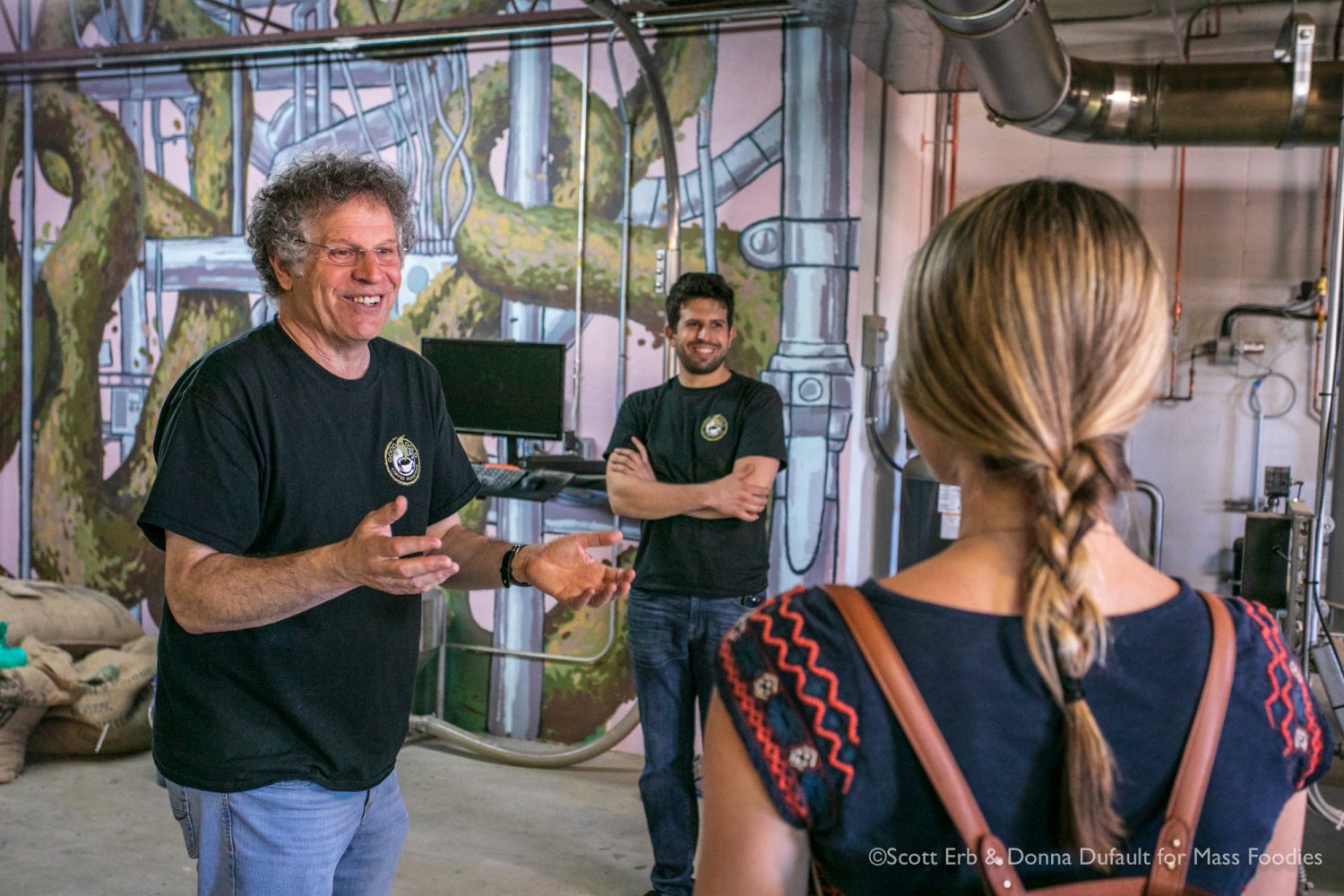
A lot of things make Dan Goldman unique, but perhaps the most shocking is his affection for millennials. “I’m so excited about the younger generation because they want to know more,” he says, “They want to learn.”
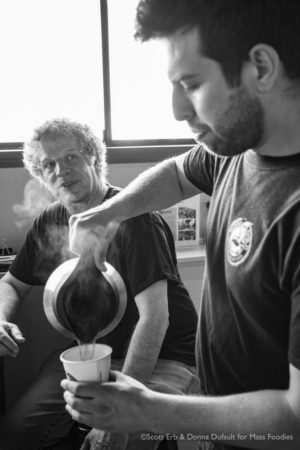
When Goldman graduated from college in 1974, he continued his education by opening up a coffee and tea shop in the Main South neighborhood of Worcester. Goldman became the first roaster to introduce single origin coffees in Central Massachusetts. He called his brand Good As Gold. “Because people enjoyed our coffee at the office more than the coffee they could buy when they went out for dinner, we decided to start selling coffee to restaurants and cafes as well,” Goldman remembers.
He is right about millennials; we do love to learn and Renee King, owner of The Queen’s Cups, is no exception. As Goldman’s Canal District neighbor, King has agreed to collaborate on an event this fall (Coffee + Dessert #1). In preparation, he has invited the Queen herself for a tour of the facility.
“You know, 15 or 20 years ago, no matter where you went, the first question was: What’s your price? Right away. Without even trying the coffee,” Goldman says. He rarely stops moving.
Mr. Goldman and his son Mike show King around, only pausing to admire the photo spectrometer, their “$4,000 toy.” This advanced roasting technology is what allows Good As Gold to ensure steadfast consistency for its customers. This is the creme de la creme of coffee-tech engineering.
Changing the Approach
From the outside, one could never imagine the air plants dangling above Good As Gold’s stainless steel countertops. Or, for that matter, the meticulously labeled beans which fill drawers of an organizer bearing an unmistakable resemblance to a library card catalog.
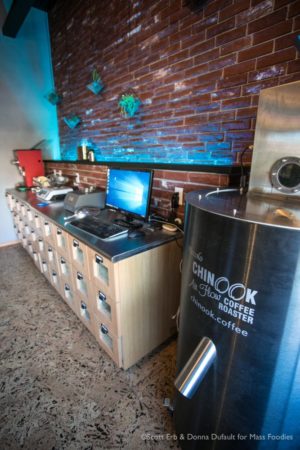
Goldman continues his analysis of Worcester’s growing coffee culture. “Now, the questions are: Where’s the coffee from? What’s the story of origin? Can you help us find these types of flavors? It’s just like wine and craft beer, we’re changing the approach towards coffee.”
Goldman feels that this is an era in which Good As Gold can come up with roasts that don’t yet exist in the local market. “This separates us and really allows us to fine-tune our process so we can take customers from origin to the final cup,” says Goldman. Mike stands by the door nodding along. The Goldmans both see a world beyond office coffee.
Mike leads us through a maze of storerooms and staircases. Upstairs, a gorgeous mural painted by RISD students depicts coffee’s journey from seed to cup in vibrant color. Fibrous bags stamped with monikers from Colombia, Costa Rica, Ethiopia, Kenya, Peru, Tanzania, Brazil, and Dominican Republic canvas every inch of available space. The rest of the room is occupied by Good As Gold’s prize air roaster. Mike explains what makes this particular system so unique, stating proudly, “We are able to take a coffee, come up with the right roast, the right color, the right everything, and scale it to our production roaster.” As far as he knows, Good as Gold is the only roaster in the country with this technology.
“We’re also what they call fairtrade certified,” Mike explains, “We pay a commission to be fair trade, so the farmers actually get money back from every bag of coffee that we sell.” Good as Gold even has coffees from Burundi. The Goldmans bought the whole farm – direct trade – when they connected with a Shrewsbury woman from Burundi who had been selling the farm’s coffee to roasters in California. “I want to be able to drink my coffee locally,” she explained, before offering the Goldmans the whole lot, which consequently went to Blue Bottle the year before.
Boutique Beans
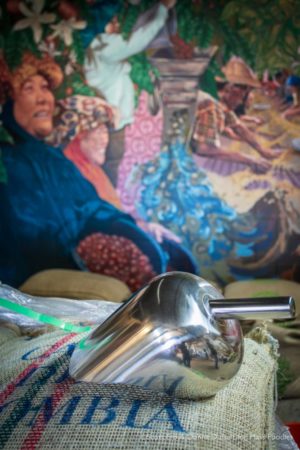
Back downstairs, Dan Goldman gestures to a barrel tucked into a corner behind Miss King and says, “That’s actually about $1,400 worth of coffee right there in that little barrel. There’s so much fraud in the coffee business where people take coffees from Columbia and they say it’s Jamaican Blue Mountain.” Good As Gold is the real deal.
Good As Gold is not interested in big production. This is a boutique operation. Goldman estimates that most coffee roasters roast a minimum of 200-300 pounds of coffee at a time, while his facility’s maximum is 50 pounds. “You know, most coffee gets distributed, it goes through a warehouse, then it goes into trucks, and by the time it gets to the end user it’s really not fresh. Our business model is to roast coffee to order.” Good As Gold’s technology can even replicate a customer’s favorite coffee with a quick spot check to measure the coloration of the ground coffee as well as the bean.
Most importantly, Good As Gold wants to be a partner to its customers. “A lot of the specialty roasters try to do what we do using their drum roasters. They go out into the marketplace and introduce their coffees and have other people market it for them. Then when they hit saturation, they go in with their own cafes and open up in the marketplace themselves. We’ve seen it happen. That’s not something that we’re doing,” he promises.
Visionary Roasters
Goldman has been doing this for longer than most. His fascination with the industry began on a trek through Europe and the Middle East in 1973. This was his first moment of realization that in other parts of the world, coffee was sold by origin rather than branding. “In America, everyone bought their coffee by the Jingle; like, Choc Full o’ Nuts was the ‘heavenly coffee,’” he recalls.
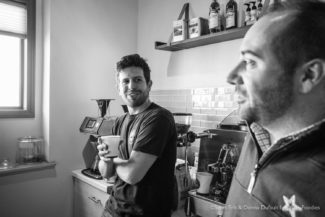
He learned by drum roasting and sold his coffee at Spag’s during the 80’s. This method depended on a lot of things occurring simultaneously. “You have radiation conduction and convection all happening in split-second time and as a roast master, you have to be super skilled in order to get the most out of the coffee because what you’re doing is listening to things. Observing the roast color. You’re able to get a few profiles of the coffee, but to replicate it from roast to roast is virtually impossible with a drum roaster,” Goldman says.
Fast forward a lot of years and Goldman’s two sons, Mike and Jay, have grown eager to elevate Good As Gold to new levels. “Knowing what we know about air roasting, we were able to find a company that built us a custom air roaster and took advantage of the technology. We’re able to really control how heat is applied to the coffee bean. We can control the outside coloration of the roast color as well as the inside to take measurements 10 times per second,” Mike says. What separates Good As Gold from everybody else is their ability to provide more consistent coffee and dial in their recipes. Air roasting technology allows for unlimited recipes or blends of coffee roast, colors, and profiles. Good As Gold is currently the only roaster in the United States with this precise technology.
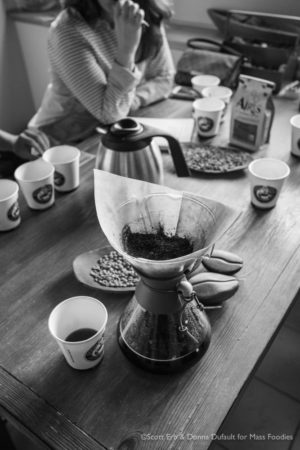
“Eventually there will be other people,” Goldman acknowledges. He wishes them luck adding, “The process was an ordeal. Meeting all the local codes when this technology is so foreign to everybody here in this country. They didn’t know what they were looking at. We had to take apart every single piece of equipment for engineering reports on every component. It was a three-year process.”
Good As Gold’s success hinges on their unflinching consistency, something King can get behind as the owner of The Queen’s Cups. “You create great cupcakes because you have wonderful recipes and you can replicate them all the time. That’s what we want to do,” Goldman tells her, “We want to empower the customer and say, okay, you want to serve coffee? Why not get involved? Why don’t you have your input, you’d be the only one to have your own signature coffee.”
She follows him into the tasting room where Mike is brewing Ethiopia Kochere Gedeo. Shining aromas of ripe blueberries wash over King, conjuring pairings in her head. The recipes will write themselves. The caffeine can’t hurt. Just as Goldman had suspected, she wants to know more.
